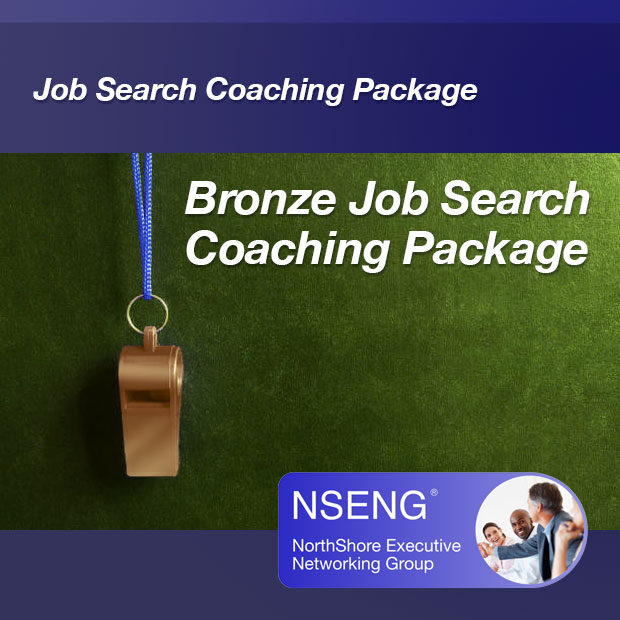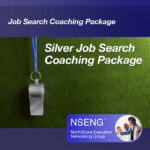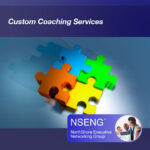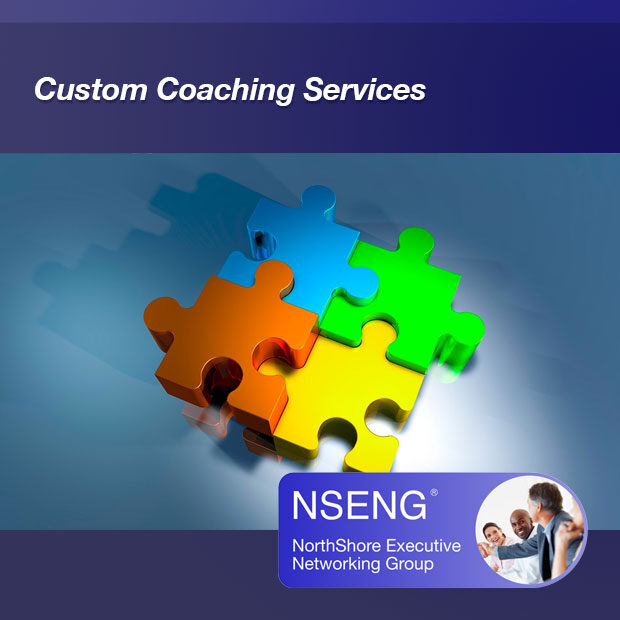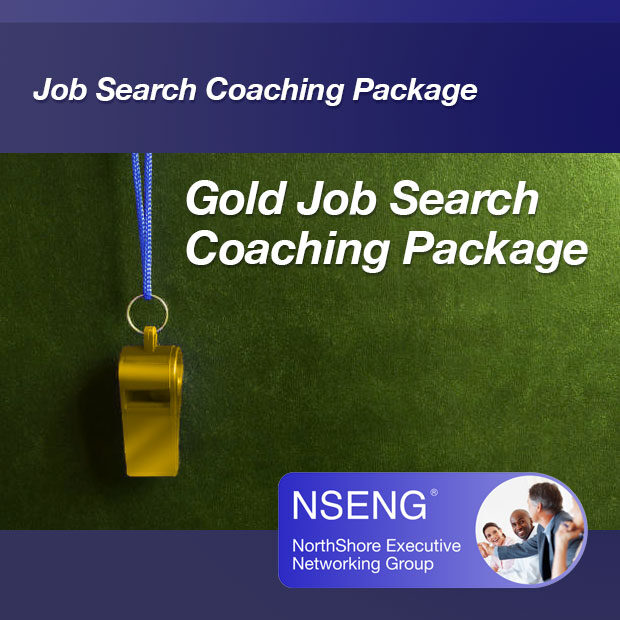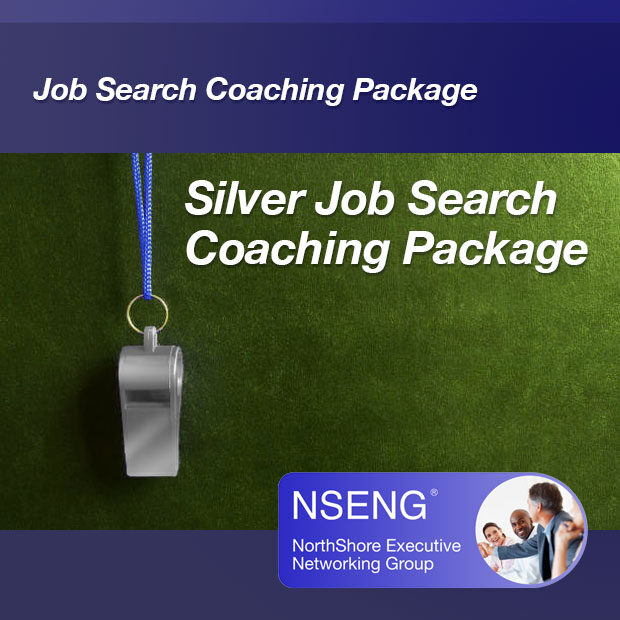BRONZE JOB SEARCH COACHING PACKAGE
$400.00
- 16-page job search plan
- 3 instructional webinar recordings
- 30-min consultative Zoom call with NSENG Founder, Marty Gilbert
- Description
- Additional information
Description
The price of the Bronze package is $400 and this program includes:
- A 16-page job search plan document which includes instructions on developing a weekly job search routine, goal-setting, tracking your progress, positioning & targeting your efforts, resume & LinkedIn profile advice, additional job search resources, networking tactics & how to engage your connections, example networking scripts, & interviewing skills advice. This document provides a great way to uncover gaps in your job search efforts along with how to better prioritize your time and tactics to achieve greater results.
- Access to 3 of the following 7 in-depth, instructional job search webinar recordings (click on each link below to view details):
Whether you’ve been job searching for 2 weeks or 2 years, this workshop will help you be more efficient with your time. Virtually every job we’ve ever had has required developing a carefully laid out plan on a monthly, quarterly or annual basis. And the job search is no different. Too many job seekers jump right into their search without having defined their plan of attack and it often results in a lot of unproductive time, unfocused efforts and longer time frames to land an appropriate position. This workshop will identify the framework and action plan that job seekers should undertake in order to develop and implement a tactical approach that maximizes your efforts, engages your audience, communicates your value and generates interviews over a shorter period of time. The following are some of the topics covered during this recording:
- 21 initiatives that every job seeker should undertake
- How to develop an effective weekly routine
- How to set job search goals and track your progress
- How to define your audience and reach your targets
- How to build a marketing plan that reaches your targets
- How to create more buzz on LinkedIn
- How to network more effectively
For individuals with more than 5 years of experience, it’s a fact that “networking” plays a significant role in over 75% of the jobs that are acquired. Networking is one of those activities that most job seekers don’t enjoy and, consequently, many individuals don’t make the most of their networking connections and one-on-one opportunities. Effective networking requires a combination of online and offline techniques that engage your audience and provide them with ways in which to help you. There are specific “dos and don’ts” of networking and those are explored during this recording. Additionally, an effective writing style plays a huge role in how to ask for help in a way that you actually get it from your network of contacts– we’ll show a few examples of those scripts as well. The following are some of the topics covered during this recording:
- Where most job seekers fail in their networking efforts
- How to set important networking goals
- How to prepare for networking opportunities
- How to make the most of each networking encounter
- How to leverage online and offline networking tactics
- Scripts for gaining networking introductions via email and LinkedIn
Having a well-constructed resume is essential to any job search. But how to write your achievements and format your resume can be a big determinant as to whether or not your document gets read. The average resume only gets 6-10 seconds of read-time with most recruiters, so you need to grab the reader’s attention quickly. That’s where a strong branding statement and a strong value proposition summary can have a significant impact– we will dig into both during this recording. The writing style also needs to say the most pertinent information in the fewest words possible. We will look at resume that are and are not effective… and why. Also, every job seeker needs to have a second version of their resume that is compliant with Applicant Tracking Systems (ATS) so that your online job applications can be read by the software– those guidelines will also be detailed and shared. The following are some of the topics covered during this recording:
- 13 keys to a strong resume
- Common resume mistakes and how to avoid them
- How to write an effective branding statement and value proposition summary
- Resume examples—what works and doesn’t work
- Specific words to avoid in your resume
- How to construct an ATS-compliant resume
Your LinkedIn profile is often the first impression that recruiters and hiring managers gather about you. And that’s why it’s become such a critical part of every job seeker’s journey. You need to treat your LinkedIn profile as if it was your e-Commerce website. Unlike your resume, your LinkedIn profile is all about Search Engine Optimization (SEO) where having a great deal of the right keywords is the single most effective way to raise your ranking with companies that are using LinkedIn to quickly identify 3-5 highly qualified candidates for each of their searches. This session will break down each section of the LinkedIn profile and what you should be doing in each area to make yourself more attractive to hiring companies. We’ll even get into some of the LinkedIn “settings & privacy” controls that you’ll want to turn on or turn off. The following are some of the topics covered during this recording:
- 15 keys to an effective LinkedIn profile
- How Search Engine Optimization (SEO) works in your profile
- How to brand yourself and your profile
- The impact of having the right keywords and achievements
- Writing styles that can raise your value in the eyes of the reader
- A breakdown of each profile section and how to draw more traffic to yourself
- Profile and privacy settings that can help your candidacy
Far too many job seekers start their search without having taken an inventory of the industries, companies and key individuals that could be the conduit to their next job. Like any project, “focus” can create a lot more productivity. And when it comes to the job search, the focus is all about creating a comprehensive target company list and the accompanying hiring managers and key influencers. Without a target company list, you are often likely to spend an inordinately large amount of your time answering online ads where you’re odds of getting an interview are typically 200 to 1. For hiring companies, candidates that aren’t coming from their industry are often easy to eliminate even if they have a great background. But with a good list of companies to target, you can address both the advertised and hidden job markets. And being able to tap into companies that don’t have advertised jobs is often the best use of your time– we’ll explain why. The following are some of the topics covered during this recording:
- How having a strong target company list creates focus and shortens your job search
- How to define and find your target industries and companies
- How to find key influential people within each company you are targeting
- Examples of how to use LinkedIn to uncover companies outside of the Fortune 1000s
- How to conduct criteria-based company and people searches
- Additional resources beyond LinkedIn that can uncover more companies and key networking contacts
Many job seekers make the mistake of assuming that Applicant Tracking Systems (ATS) determine who does and who doesn’t get a job interview. And that couldn’t be further from the truth. I have had many coaching clients who have been rejected by an ATS within 15 minutes of submitting their online application and they’ve still be able to get interviews because of the strength of their cover letter and who they sent it to. Resumes tell, but cover letters sell and a good cover letter connects your background to the most important requirements of the job. With the messaging approach I’ve developed, you’ll be able to create customized cover letters in less than 30 minutes. That’s what opens the door and that’s how you control the story that connects the dots between key job requirements and your background. The following are some of the topics covered during this recording:
- 6 keys to an effective cover letter
- How to decipher the most important requirements of a job description
- How to connect your achievements to the job description
- Why a good cover letter can open far more doors than a resume
- How to create a “plug and play” cover letter format that enables faster compositions
- Examples of effective cover letters
The job interview is a performance, and you need to make sure you’re well-prepared and well-positioned to differentiate yourself vs other candidates. All too often, job seekers don’t take an anticipatory approach to a job interview and, as a result, can get blindsided by questions that throw them off and don’t enable them to convey the confidence they want. Whether you’re being interviewed by phone or in-person, the right kind of preparation can make a very significant difference in the way you are perceived. During this session specific advice and tactics will be shared to help make you a stronger candidate through the interview process. The following are some of the topics covered during this recording:
- 8 keys to a successful interview
- 12 specific tips for better phone screens and in-person interviews
- How interviewers determine who is the strongest candidate
- Tough questions you should be prepared to answer
- How to prepare for “behavioral-based” questions
- Important questions for you to ask at each interview
- How to leverage LinkedIn as part of your interview preparation
- How to develop a 90-day onboarding plan to increase your candidacy
- A 30-minute job search coaching phone call with Marty Gilbert, NSENG’s CEO, on whatever topics you’d like to discuss. We suggest that this call take place within 3 weeks of your payment date so you can quickly begin implementing some of Marty’s suggestions. You can discuss any job search topics you wish– here are a few examples:
- A review of your job search efforts and how to increase your activity
- A critique of your resume or LinkedIn profile
- How to increase traffic to your LinkedIn profile
- How to overcome being viewed as over-qualified
- How to make yourself more memorable and more likable during interviews
- How to network more effectively
- How to prioritize the order of your job search
- How to develop a 90-day onboarding plan for interviews
- How to get unstuck in your job search
Additional information
| video 1 | video1 |
|---|---|
| video 2 | video2 |


